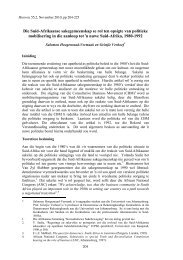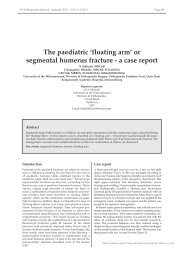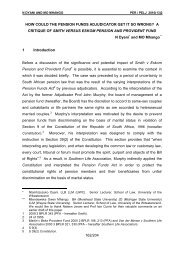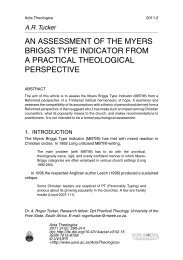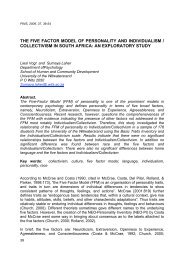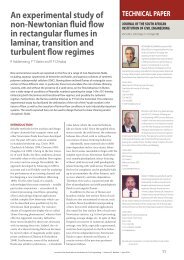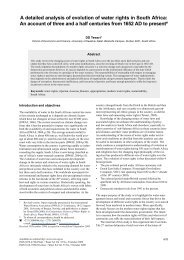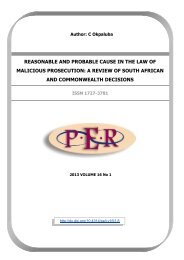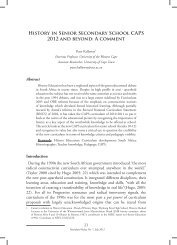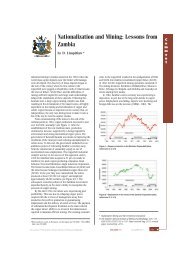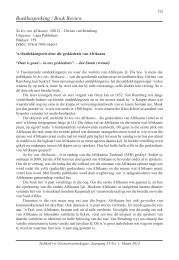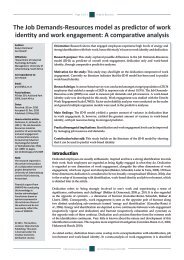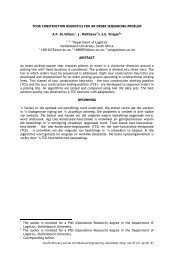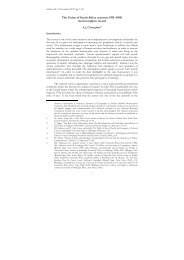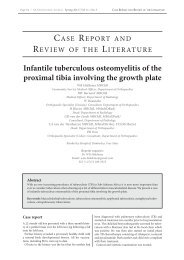91 Hendrik Verwoerd and the Leipzig School of Psychology in 1926 ...
91 Hendrik Verwoerd and the Leipzig School of Psychology in 1926 ...
91 Hendrik Verwoerd and the Leipzig School of Psychology in 1926 ...
You also want an ePaper? Increase the reach of your titles
YUMPU automatically turns print PDFs into web optimized ePapers that Google loves.
<strong>Hendrik</strong> <strong>Verwoerd</strong> <strong>and</strong> <strong>the</strong> <strong>Leipzig</strong> <strong>School</strong> <strong>of</strong> Pscyhology<br />
though Wundt himself dismissed <strong>the</strong> new field for its <strong>in</strong>adequately<br />
developed <strong>the</strong>ory <strong>and</strong> methodology. 15<br />
Wundt was succeeded as director <strong>of</strong> <strong>the</strong> Institute for Experimental<br />
<strong>Psychology</strong> by Felix Krueger (1874–1948), one <strong>of</strong> his many former students,<br />
<strong>in</strong> 1<strong>91</strong>7. Interest<strong>in</strong>gly, Wundt recommended Krueger for <strong>the</strong> position<br />
although Krueger had rejected Wundt’s approach to psychology by this<br />
time. 16 In <strong>the</strong> 1920s, <strong>the</strong> <strong>in</strong>stitute occupied 34 rooms <strong>in</strong> <strong>the</strong> university’s ma<strong>in</strong><br />
build<strong>in</strong>g as well as a smaller <strong>of</strong>fice <strong>in</strong> <strong>the</strong> city, huge for <strong>the</strong> time. Krueger had<br />
four regular assistants, each <strong>of</strong> whom was responsible for his own<br />
department: Pr<strong>of</strong>essor Otto Klemm was responsible for applied psychology<br />
<strong>and</strong> experimental pedagogics; Pr<strong>of</strong>essor August Kirschmann for<br />
measurement methods <strong>and</strong> psychology <strong>of</strong> perception; Pr<strong>of</strong>essor Friedrich<br />
S<strong>and</strong>er for psychology <strong>of</strong> <strong>the</strong> higher functions; <strong>and</strong> Privatdozent Hans<br />
Volkelt for developmental psychology, <strong>in</strong>clud<strong>in</strong>g child psychology. 17<br />
Like many German psychologists <strong>of</strong> his time, Krueger had a strong<br />
aff<strong>in</strong>ity for philosophy. This was noth<strong>in</strong>g unusual s<strong>in</strong>ce psychology was<br />
widely regarded as an auxiliary science to philosophy <strong>and</strong> was usually<br />
<strong>in</strong>tegrated <strong>in</strong>to <strong>the</strong> philosophy department. The aim <strong>of</strong> cognitive psychology<br />
was to explore <strong>the</strong> empirically verifiable foundations <strong>of</strong> philosophical<br />
epistemology. It would take decades for psychology to emancipate itself<br />
from philosophy, a process that was reflected <strong>in</strong> <strong>the</strong> slow pace <strong>of</strong><br />
establish<strong>in</strong>g separate chairs <strong>and</strong> <strong>in</strong>stitutes. A heated debate around <strong>the</strong><br />
methodology <strong>in</strong> <strong>the</strong> humanities made it particularly difficult for <strong>the</strong> new<br />
discipl<strong>in</strong>e to f<strong>in</strong>d a niche somewhere between <strong>the</strong> natural sciences <strong>and</strong> <strong>the</strong><br />
humanities. This was because <strong>the</strong>ir differences were magnified at a time<br />
when <strong>the</strong> humanities were seek<strong>in</strong>g <strong>the</strong>ir own autonomy. Heavily <strong>in</strong>fluenced<br />
by historicism, <strong>the</strong>y saw <strong>the</strong>mselves as “ideographic” human sciences<br />
(Geisteswissenschaften) as opposed to <strong>the</strong> “nomo<strong>the</strong>tic” natural sciences. 18<br />
Under Krueger, <strong>the</strong> <strong>Leipzig</strong> psychologists positioned <strong>the</strong>mselves<br />
unequivocally on <strong>the</strong> side <strong>of</strong> <strong>the</strong> humanities, as did most psychologists.<br />
15. Very <strong>in</strong>structive is R.R. H<strong>of</strong>fman <strong>and</strong> K.A. Deffenbacher, “A Brief History <strong>of</strong> Applied<br />
Cognitive <strong>Psychology</strong>”, Applied Cognitive <strong>Psychology</strong>, 6, 1992, pp 1–48, especially<br />
pp 1–18. On applied psychology see F. Dorsch, Geschichte und Probleme der<br />
angew<strong>and</strong>ten Psychologie (Hans Huber, Bern <strong>and</strong> Stuttgart, 1963), pp 36ff. <strong>and</strong> p<br />
44.<br />
16. University Archives <strong>Leipzig</strong> (hereafter UAL), Phil. Fak., Micr<strong>of</strong>ilm 1272, No. 664,<br />
Personal File: Felix Krueger, Documents 25 <strong>and</strong> 28.<br />
17. UAL, Psychological Institute, Brochure, “Psychologisches Institut und Staatl.<br />
Forschungs<strong>in</strong>stitut für Psychologie bei der Universität <strong>Leipzig</strong>”. See also W.<br />
Thiermann, “Zur Geschichte des <strong>Leipzig</strong>er Psychologischen Institutes, 1875–<br />
1945”, PhD <strong>the</strong>sis, Karl-Marx-Universität, <strong>Leipzig</strong>, 1981, p 86; <strong>and</strong> U. Geuter,<br />
Daten zur Geschichte der deutschen Psychologie, vol. 1: Psychologische Institute,<br />
Fachgesellschaften, Fachzeitschriften und Serien, Biographien, Emigranten 1879–<br />
1945 (Verlag für Psychologie, Gött<strong>in</strong>gen <strong>and</strong> Zürich 1986), pp 62ff.<br />
18. W. Dil<strong>the</strong>y, Der Aufbau der geschichtlichen Welt <strong>in</strong> den Geisteswissenschaften,<br />
(Suhrkamp, Frankfurt, 1981), pp 101ff; G.G. Iggers, Deutsche<br />
Geschichtswissenschaft, (DTV, München, 1971), pp 175ff.<br />
95



